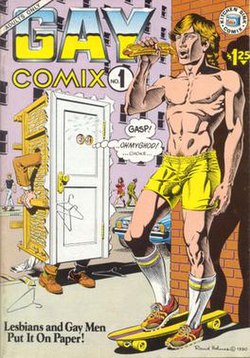Gay Comix
| Gay Comix | |
|---|---|

Gay Comix #1 (Sept. 1980). Art by Rand Holmes.
|
|
| Publication information | |
| Publisher |
Kitchen Sink Press (1980–1984) Bob Ross (1985–1998) |
| Schedule | Irregular |
| Format | anthology |
| Publication date | Sept. 1980 – July 1998 |
| Number of issues | 25 |
| Editor(s) | Howard Cruse, Robert Triptow, Andy Mangels |
Gay Comix (later Gay Comics) is an underground comics series published from 1980–1998 featuring cartoons by and for gay and lesbian men and women. The comic books had the tagline “Lesbians and Gay Men Put It On Paper!”
Much of the early content was autobiographical, but more diverse themes were explored in later editions. The contents of Gay Comix were generally about relationships, personal experiences, and humor, rather than sex. It is generally less sexually explicit than the similarly-themed (and male-focused) Meatmen series of graphic novels. Its editors each made a deliberate effort to feature work by both women and men.
Kitchen Sink Press published the first five issues of Gay Comix; thereafter it was published by Bob Ross, publisher of the Bay Area Reporter gay newspaper.
The first four issues were edited by Cruse; issues #5 through #13 were edited by Triptow. Andy Mangels edited issues #14 to #25 and a special issue featuring Barela; Mangels changed the title to Gay Comics starting with issue #15, in part to divest it of the "underground" implications of "comix".
Excerpts from Gay Comix were included in a 1989 anthology titled Gay Comics.
The idea for Gay Comix came from Denis Kitchen, a publisher of underground comics through the company he founded, Kitchen Sink Press. In 1979, after realizing underground cartoonist Howard Cruse was gay, Kitchen asked him to edit an anthology of gay comic artists. The two had worked together previously; Cruse’s comic Barefootz was published through Kitchen Sink Press. A call was put out for artists through comics magazine Cascade Comix Monthly. Gay Comix aimed to get the gay and lesbian contributors to write about things that had happened to them, and experiences they had had. Originally Cruse had reservations about editing the anthology. “He [Cruse] had never publicly, in print, declared he was gay…he thought coming out would only add to his woes.” Cruse decided that “it would be cowardly” to decline the editor position for these reasons.
...
Wikipedia
